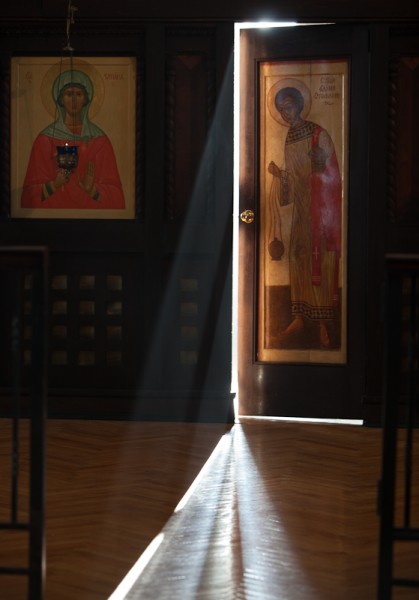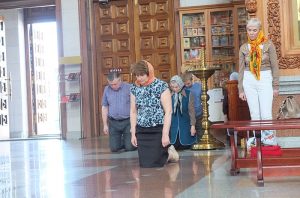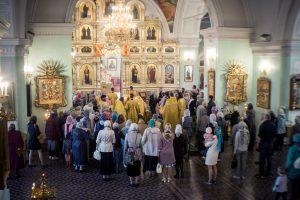I was having lunch at a friend’s restaurant in West Los Angeles the other day when I spotted a parishioner at another table enjoying a meal with his wife. I went over to greet them with a big hug and after some small talk I told Alex and Calliope that it had been months since I had seen them in church and I missed them. The last time I had seen them briefly was at the Easter Divine Liturgy.
“Thanks for asking Father,” Alex said, “but you know we have subscribed to several Greek TV channels and watch the Liturgy from different parts of Greece on Saturday night and that seems to do it for us.”
It wasn’t the first time I have heard such an answer. I’m hearing it more often. “to be honest with you Father, we really enjoy the television services from the old country. The splendid vestments of the bishops and priests and my, the beautiful voices of the deacons as they chant the petitions in Greek. The authentic and splendid Byzantine iconography and those chanters remind me of my old village in Greece. Every Saturday we can relive the glories of Byzantium and the cultural heritage of our people. Not only that, but we can have dinner with friends over at our house while the televised Liturgy is going on. It’s enough for us. If the phone rings I can mute the channel and if I don’t like what the bishop is saying I can turn him off. Oh, by the way, when is the next LA Greek Festival?”
I, of course, wished them well, invited them to church with a smile and returned to my table.
What a pity, I thought, Liturgy via satellite; impersonal and without involvement or participation; in a sense a form of “religious entertainment.” No demands, no obligations – just a nostalgic, religiouscultural fix from far away.
Of course there is nothing intrinsically wrong with watching the Liturgy on television. One can be inspired and educated in a limited sense but the part of participating personally in the Divine Liturgy is missed.
There is no substitute for sacramentally participating and praying with fellow believers in church. So many of our Orthodox Christians have limited themselves to seeing the Church strictly as a religiously cultural experience devoid of an ongoing relationship with Jesus Christ in the context of community.
Televised Liturgy for shut-ins and those not able to attend church for a time is certainly acceptable. But where is the fellowship? No Holy Communion, no required reverence, no prayer, no offering of oneself, no involvement, no repentance, no spiritual growth, no feeding on the Word and no sanctification.
So many of our people who wear crosses as jewelry accessories or wear what has become trendy Komboskinia (prayer cord bracelets) on their wrists, do it as a cultural fashion statement. They become cultural Christians where their expression of faith, if any, is generic. Anything goes.
Cultural Christians see Christ only in the merits of iconographic art, often arguing if an icon is truly in the Byzantine style or not, and miss the whole point of the icon’s purpose. They’ll use such clichés as “This is Western and not really Greek.”
Cultural Christians see the church building not as the spiritual house of God, a place of worship, a holy place, but an architectural statement where domes or no domes or arches determine the religious validity of the structure.
Cultural Christians hear the hymns sung by the church choir and judge its beauty and correctness by nostalgic standard of their past cultural experience. Cultural Christians, and I have heard it from some prominent leaders of the Church, quietly say they don’t believe in the basic Credal statements of our Orthodox Faith. They really don’t believe in the Virgin birth of our Lord, the Divinity of Christ, His bodily Resurrection or Ascension; and one man said to me when referring to the Lord’s Ascension, “What, He went up like in a hot air balloon? Give me a break.” Yes, we recite the Nicene Creed but, for many, its just words, like children in school reciting the Pledge of Allegiance; words coming out automatically without understanding or meaning.
Cultural Christians demand that the Church provide them and their families with entertainment, parties, sports, and social activities devoid of balance between the secular and the sacred. Many avoid a stewardship commitment. They know the cost of everything, but the value of nothing. One family left St. Sophia and went to the Baptist Church because their son could get saxophone lessons and play in the church “worship band.”
Thus we see that cultural Christianity crosses denominational lines. Orthodox Christians don’t have a monopoly on it.
English poet William Blake stated, “And we are put on earth a little space that we may learn to bear the beams of love.” Avoiding intimate involvement in the Church and experiencing true spiritual growth, we fashion “protective clothing and leaden aprons of indifference” that resist the spiritual radiation of God’s uncreated “beams of love.”
There is a story of the proud young father, whose little son comes to him one day in a questioning mood. The son asks, “Dad, who is God?” The father thinks for a moment and then answers his son, “You know, Son, I’m not really sure…but I know He’s supposed to be important to us somehow.” The son pauses a bit and then asks, “Well, Dad, what about this man named Jesus? Why do we have all those pictures of Him in church?” The father peevishly scratches his head and responds, “Umm…I’m not really sure I know. But I do know that He’s pretty important to us.”
So the son looks up to his father once again and asks, “Dad, what about when the priest brings out that gold cup with the spoon? Why is he doing that?” The father is starting to get a bit nervous now because he’s drawing a complete blank, but he answers his son honestly, “Son, I’m not really sure how to answer that either. But I do know that it’s pretty important to us.” After a few minutes of silence, the son looks up to his father to ask one final question. “Dad, you don’t mind me asking you all this stuff, do you?”
The father, his heart swelling with great pride for his little one’s precociousness, smiles down at his young son and responds with confidence, “Of course I don’t mind, Son! How else are you going to learn?”
My fellow priests can relay such stories from their own experiences in parish life. Yet when the struggles, suffering and pains of life hit, when darkness and desperation affects us, when a relationship abruptly ends and when death visits our family, where do we get the strength? The strength comes from above; from the beams of love of our Lord Jesus Christ, who is present in our midst, through His Holy Church. It is He who said, “Where two or three are gathered together in My Name, I am there in the midst of them.” (Matt. 18:20) It is in the intimacy of liturgical worship that the God–Man Jesus the Savior says to us, “Come to Me, all you who labor and are heavy laden and I will give you rest. Take my yoke upon you and learn from Me, for I am gentle and lowly in heart and you will find rest for your soul.” (Matt. 11:28-29)
St. John Chrysostom, my favorite among the saints, sums it up best. “Nothing makes my life so full of joy as the sight of you flocking so joyfully to the Church. In the Church the joyful will preserve their joy; in the Church the disconsolate will find courage; in the Church the troubled will become happy; in the Church the spiritually weary will find rest; in the Church, refreshment beckons to the heavy laden.”To these eternal truths we say, “Amen”.
Fr. Bakas is dean of St. Sophia Cathedral, Los Angeles, and a faculty member of Loyola Marymount University, School of Theology.




















